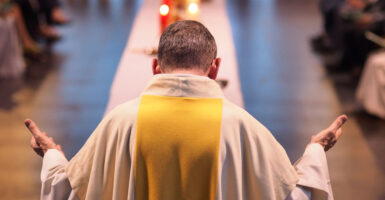The French government is targeting a Catholic priest for calling homosexuality a “weakness” and declaring that homosexual acts and relationships are sinful.
Father Matthieu Raffray, a Catholic priest of the traditionalist society Institut du Bon Pasteur, posted a video to social media last month encouraging Christians to fight against their sins, which he says are forms of “weakness.” Among the sins Raffray named was homosexuality. He preached, “We all have weaknesses: those who are greedy, those who are angry, those who have homosexual tendencies!”
The priest faced immediate backlash from LGBTQ activists and organizations, and French Minister for Gender Equality and Fight Against Discrimination Aurore Bergé called Raffray’s preaching “unbearable.”
She added that she has asked the Interministerial Delegation for the Fight against Racism, Anti-Semitism, and Anti-LGBT Hatred “to make a report to the public prosecutor” to determine whether the priest’s preaching constitutes a crime. “I will not let anything go in the face of hatred, whatever it may be,” Bergé said.
The delegation responded that it had filed a report with the public prosecutor, alleging that Raffray’s reference to homosexuality as a “weakness” to be overcome may violate the French ban on “conversion therapy.” The organization commented, “So-called ‘conversion therapy’ has been illegal since 2022. Talking about homosexuality as a weakness is shameful.”
In an interview with the French Catholic news outlet Famille Chrétienne (Christian Family), Raffray explained, “It’s a video that talks about temptations in general. I wanted to make it clear that we are not obliged to give in to all our temptations, all our desires. I mention homosexuality among other things.” He continued, “Homosexual acts are a sin but I think people no longer know what a sin is. Denouncing a sin does not mean denouncing the person who commits the sin!”
“What is at stake is not me but the freedom to be Christian today. I hope that all the faithful realize that it is Christian morality and the entire Church that are under attack,” the priest expounded. “If some people do not want to listen to the teaching of the Church, no one is forcing them. But many people are suffering and need this discourse from the Church which helps them not to become a slave to homosexuality or any other passion.”
Raffray also denounced the allegation that his comments were “homophobic.” The priest said, “Not only am I not homophobic but moreover, as a priest I am careful with the vocabulary I use on this issue, because I know that the subject is sensitive and that people can easily be hurt.” He added, “I insisted on the fact that we had to have respect for these people, their personal difficulties, and their inner struggles.”
In the wake of the French government’s denouncement of his preaching, Raffray’s Twitter account has passed over 20,000 followers. The priest quipped, “Thank you all for your support. Thanks also to the hysterics of all stripes who try to destabilize me with grotesque controversies: publicity assured … ” He added, “Friends or enemies: I pray for you.”
Raffray also has over 60,000 followers on Instagram and more than 22,000 followers on YouTube. A professor at the Pontifical University of St. Thomas Aquinas (Angelicum) in Rome, Raffray holds a doctorate in philosophy and uses his social media influence to teach his followers about Christian life and the Catholic faith. He has also published several books, including “Myths and Lies of Progressivism” and “The Greatest of Combats,” a recent publication centered around the Christian fundamentals of masculinity.
Raffray’s popularity as a public figure began to grow in 2020, after an interview in which he called for a renewal of “virile Catholicism” and Christian patriotism. He is a priest of the Institut du Bon Pasteur, a fraternity of traditionalist Catholic priests who celebrate the pre-1970s Tridentine Mass. The organization has priests stationed around the world, including in France, Italy, Poland, the United States, South America, and Africa.

























